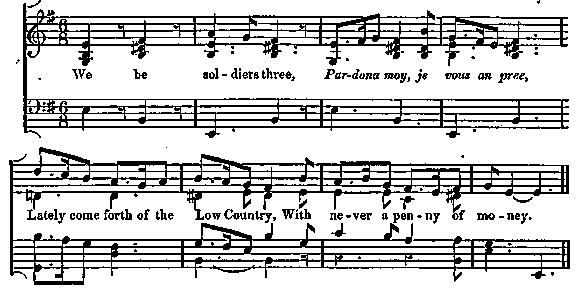Popular Music Of The Olden Time Vol 1
Ancient Songs, Ballads, & Dance Tunes, Sheet Music & Lyrics - online book
| Share page | Visit Us On FB |
|
FROM HENRY VII. TO MARY. |
77 |
|||
|
WE BE SOLDIERS THREE. |
||||
|
|
||||
|
This is also one of the King Henry's Mirth or Freemen's Songs in Deutero-1609, and will be found as a song in Wit and Mirth, or Pills to Purge Melancholy, vol. i., 1698 and 1707. |
||||
|
|
||||
 |
||||
|
Here, good fellow, I drink to thee, And he that will not pledge me this,
Par dona moy, je vous an pree; a Par dona moy, je voiis an pree,
To all good fellows, wherever they be, Pays for the shot -whatever it is,
With never a penny of money. With never a penny of money.
Charge it again, boy, charge it again,
Pardona moy, je vous an pree ; As long as there is any ink in thy pen,
With never a penny of money. |
||||
|
WE BE THREE POOR MARINERS.
This is one of the King Henry's Mirth or Freemen's Songs in Deuteromelia, 1609, and is to be found as a dance tune in the Skene MS. (about 1630), called Brangill of Poictu,—i.e., Branle, or Brauleof Poictu.
Braules a were dances much in vogue with the upper classes during the sixteenth and seventeenth centuries. Their being danced at "Whitehall in 1623, has been mentioned at page 73; and Pepys speaks of them at the Court of Charles H. Branle de Poictu is explained by Morley (1597) as meaning the Double Branle, in contradistinction to the French Branle, or Branle-Simple.
Another Branle de Poictu (quite a different tune) will be found in the Straloch Manuscript, for the name was given to any air used for the dance. It was so |
||||
|
|
||||
|
» " These pardonnez-moy's who stand so much on the new form."—Romeo and Juliet, act ii., sc. 4. Dr. Johnson in a note says: " Pardonnez mot became the language of doubt or hesitation among men of the swoTd, when the point of honour was grown so delicate that no other mode of contradiction would be endured."
* Braules, which, Mr. M. Mason observes, seem to be what we now call cotillons, are described by Philips as |
"akindof dance in which several persons danced together In a ring, holding one another by the hand." In Marston's play of The Malcontent there is a minute, but perhaps not now very intelligible description of the figures. See Dodsley's Collection of old Plays, vol. iv. Braules are alluded to by Shakespeare, Ben Jonson, Massinger, and others. |
|||